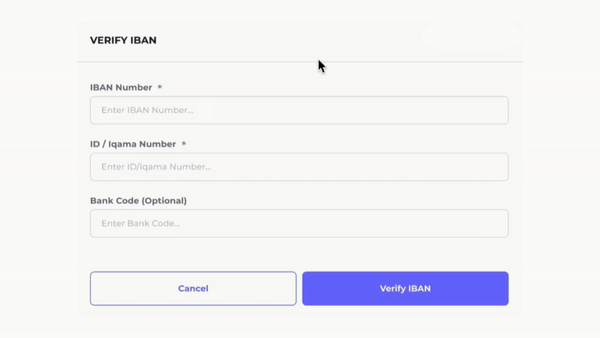IBAN Verification in the UAE: Regulatory Challenges and Best Practices

Accelerate AML Compliance: Meet Regulatory Demands with 80% Less Setup Time
In the UAE, IBAN verification is essential for ensuring secure and compliant financial transactions. With strict regulations from the Central Bank of the UAE (CBUAE) and global standards like FATF, accurate IBAN checks are crucial for preventing fraud and meeting AML requirements.
What is an IBAN and Why Is It Used in the UAE?
An IBAN stands for International Bank Account Number and it is a globally standardized code used to uniquely identify a bank account when sending or receiving money internationally. It ensures that transfers are sent to the correct account by reducing errors caused by incorrect account numbers or formats.
In simple terms, an IBAN acts like a postal address for bank accounts because it tells the system exactly where the money needs to go, across borders and banking systems.
In the UAE, IBANs are mandatory for all inward and outward electronic payments as per CBUAE guidelines since 2011. This requirement aligns with FATF Recommendation 16, which calls for accurate originator and beneficiary information in wire transfers.

IBAN Importance in the UAE
As mentioned above, the Central Bank of the UAE (CBUAE) made the use of IBAN mandatory for all electronic payments in 2011, and this move was part of aligning the UAE’s banking system with global financial standards.
Key reasons for its implementation include:
- Improved accuracy: Fewer transfer errors due to incorrect account numbers
- Faster processing: Automates validation, speeding up transactions
- Increased security: Minimizes the risk of misrouted or fraudulent payments
- Regulatory compliance: Meets international requirements, including FATF Recommendation 16, which mandates that both the originator and beneficiary’s account details be clearly identified in wire transfers
Banks operating in the UAE are responsible for generating and assigning IBANs to all customer accounts. These can be found on bank statements or online banking portals. Financial institutions must also ensure their systems validate IBANs before initiating transfers.
IBAN Format and Structure in the UAE
What is the IBAN Format in the UAE? An IBAN in the UAE comprises 23 alphanumeric characters, structured as follows:
- Country Code: AE (2 letters)
This indicates the country where the bank account is held. For the UAE, the country code is always AE.
- Check Digits: 2 digits
These two digits play a critical role in validating the IBAN's accuracy. They help detect any errors in the account number by confirming that the IBAN is correct before the transaction is processed.
- Bank Identifier: 3 digits
These digits identify the specific bank where the account is held. For example, a bank like Emirates NBD might be represented by a specific code such as 103.
- Account Number: 16 digits (left-padded if necessary)
This portion is unique to the individual account holder and can be padded with leading zeros if necessary to meet the 16-digit requirement.
UAE IBAN Example
AE21 0678 3456 7890 1234 567
In this example:
- AE is the country code for the UAE.
- 21 are the check digits.
- 0678 is the bank identifier (specific to the bank).
- 3456 7890 1234 567 is the account number, which is unique to the customer.
Comply quickly with local/global regulations with 80% less setup time
How Does IBAN Verification Work in the UAE?
IBAN verification is the process of validating the accuracy, format, and authenticity of an IBAN before initiating a transaction. Here's how it works technically:
- Syntax Check: Ensure correct length (23 characters for UAE), alphanumeric structure, and country code (AE).
- Check Digit Validation: Mathematical validation using the MOD 97 algorithm, as specified in ISO 13616.
- Bank Identifier Check: Verifies that the 3-digit code corresponds to a licensed bank in the UAE.
- Account Number Validation: Confirms structure and consistency with bank-specific formats.
These validation layers are critical for IBAN checker UAE systems to prevent transaction errors and mitigate fraud.
Methods of IBAN Verification in the UAE
There are several ways to perform IBAN verification depending on your institution’s infrastructure:
1. Manual IBAN Check
Manual verification is the most basic method for validating IBANs. This involves checking the IBAN structure, length, and country-specific format manually or using online tools or bank websites. This method is simple but slow, prone to human error, and not scalable for high-volume operations.
2. Automated IBAN Validator Tools
API-integrated tools allow for real-time IBAN validation, ideal for onboarding, payroll, or high-volume transfers. For example, the FOCAL platform, offers an AI-powered IBAN Validator, which is a solution specifically designed for the UAE market, allowing financial institutions to perform check IBAN number routines systematically across channels with a focus on local regulatory compliance.
Benefits:
- Speed
- Accuracy
- Scalability
Why IBAN Validation Matters for AML and Fraud Prevention
IBAN validation helps institutions reduce risks and ensure accurate, secure payments.
- Prevent synthetic identity fraud using invalid account numbers.
- Detect business email compromise (BEC) schemes that spoof payment instructions.
- Identify sanctioned or shell accounts during transaction screening.
- Enforce risk-based controls based on IBAN metadata (e.g., foreign vs. domestic).
Key Challenges in IBAN Verification

By addressing these challenges, financial institutions in the UAE and beyond can strengthen transaction integrity, improve compliance with regulatory standards, and reduce fraud exposure.
- Legacy Infrastructure: Many financial institutions still operate on outdated core banking systems that were not designed to handle modern demands like real-time IBAN validation or seamless API integrations. These limitations make it harder to automate verification processes or implement cutting-edge fraud detection tools, increasing the risk of errors and delays.
- Volume Complexity: Large institutions may need to verify thousands, or even millions, of IBANs daily, especially when processing bulk payments or high volumes of international transactions. If the process is manual or semi-automated, it becomes inefficient, prone to errors, and difficult to scale securely.
- Fraud Techniques: Fraudsters can exploit gaps in weak or inconsistent IBAN verification systems. One tactic involves using synthetically generated but structurally valid IBANs that point to unauthorized or compromised accounts. Without strong verification checks, these fraudulent IBANs can pass through unnoticed, exposing institutions to financial crime.
- Lack of Standardization: Even though the IBAN format is globally standardized, the way financial institutions in different jurisdictions (or even within the same country) implement verification can vary.
Some may conduct only basic format checks, while others perform deeper validations such as checking account existence or ownership. This inconsistency increases systemic risk, especially in cross-border transactions.
Best Practices for IBAN Validation in the UAE
These practices align with CBUAE’s Risk-Based AML Supervision Manual and help institutions reduce financial crime exposure.
- Use automated validation tools for real-time IBAN checks and error prevention.
- Integrate validation into AML systems like onboarding, screening, and monitoring.
- Ensure compliance with CBUAE and ISO 13616-1 format requirements.
Train staff regularly on IBAN rules and risk indicators.
- Check IBAN and Audit validation processes to catch gaps and ensure consistent enforcement.
FOCAL Solutions for Fast and Secure IBAN Checks in the UAE

FOCAL streamlines IBAN verification by linking account details with official identification. The process starts when the system receives an IBAN along with a Customer ID such as an Emirates ID, Iqama, or commercial license number. It then checks this data against verified sources to confirm that the account information is legitimate.
The platform ensures that the ID matches the IBAN, and if everything aligns, it returns a “TRUE” status along with the name of the account holder. This confirms both the ownership and integrity of the account. FOCAL also supports bulk IBAN verification, allowing businesses to validate large volumes of accounts quickly and efficiently minimizing errors and helping prevent fraud.
To discover how FOCAL can enhance your IBAN verification capabilities and support your compliance goals, schedule a personalized demo with our team.
FAQs:
Q1. What’s the difference between Routing Numbers, SWIFT Codes, BICs, and IBANs?
Each of these codes serves a different function and is used depending on the nature and destination of the transaction.
- IBAN: Identifies the account
- SWIFT/BIC: Identifies the bank internationally
- Routing Number: Primarily used in the U.S. to identify banks
- The IBAN often includes routing and account data in one string for ease of cross-border processing
Read more: IBAN Vs. SWIFT Code: What’s the Difference?
Q2. Do you need an IBAN in the UAE?
Yes, an IBAN is required for all domestic and international wire transfers in the UAE. Without a valid IBAN, banks will reject or delay transactions. Moreover, failure to use or validate IBANs can trigger compliance red flags during audits or suspicious transaction monitoring.
Q3. What is the MOD 97 algorithm?
The MOD 97 algorithm is a specific mathematical formula used to calculate and validate the check digits of an IBAN. The process begins by rearranging the IBAN, where the check digits and country code are moved to the end of the number. Once rearranged, the IBAN is treated as a large integer and subjected to the MOD 97 operation, which involves dividing the number by 97. If the remainder of this division is 1, the IBAN is considered valid. However, if the remainder is not 1, the IBAN is deemed invalid. This mathematical check helps ensure that the IBAN is correctly formatted and reduces the risk of errors in financial transactions.








.jpg)
.jpg)
.jpg)